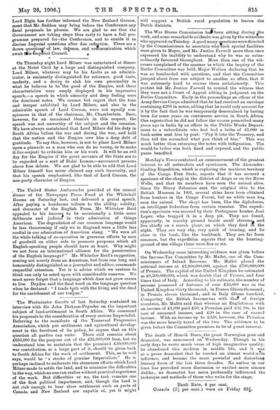The War Stores Commission ha/ been sitting during i the week,
and some remarkable evidenbe was given by the witnesses who appeared onTuesday. A good manyqatestions were directed by the Commissioners to ascertain whyiuch special facilities were given to Meyer, and Mr. Justice Farwell more than once expressed his inability to understand why he was so extra- ordinarily favoured throughout. More than one of the wit- nesses complained of the manner in which the inquiry of the Butler Committee was held, Major Walton declaring that he was so bombarded with questions, and that the Committee jumped about from one subject to another so often, that it was extremely hard to answer them satisfactorily. This protest led Mr. Justice Farwell to remind the witness that they were not a Court of Appeal sitting in judgment on the Butler Committee. Early in the proceedings an officer of the Army Service Corps admitted that he had received an envelope containing £200 in notes, adding that he could only account for it by the fact that he was temporarily demoralised by having been for some years on continuous service in South Africa. One regrets that he did not follow the course prescribed many years ago in India by an officer in the Public Works Depart- ment to a subordinate who had had a bribe of £1,000 in bank-notes sent him by post: "Pay it into the Treasury, and then tell the scoundrel what you think of him." This was much better than returning the notes with indignation. The would-be briber was both fined and exposed, and the public purse benefited.










































 Previous page
Previous page